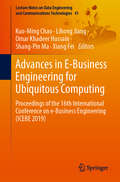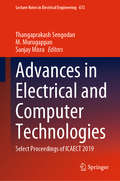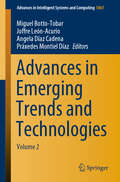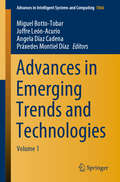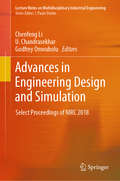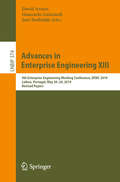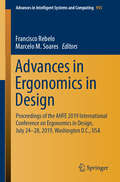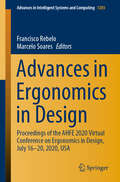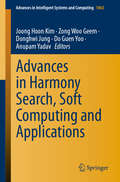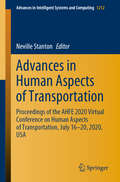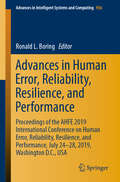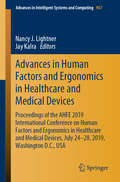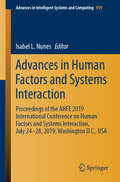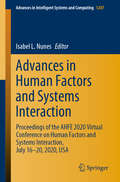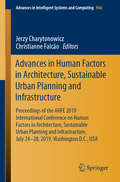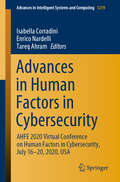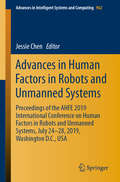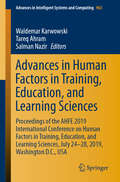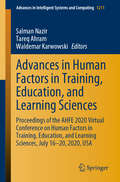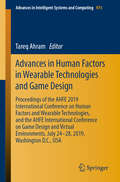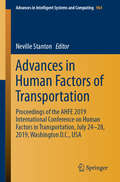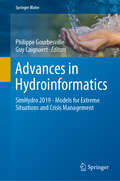- Table View
- List View
Advances in E-Business Engineering for Ubiquitous Computing: Proceedings of the 16th International Conference on e-Business Engineering (ICEBE 2019) (Lecture Notes on Data Engineering and Communications Technologies #41)
by Kuo-Ming Chao Lihong Jiang Omar Khadeer Hussain Shang-Pin Ma Xiang FeiThis book presents the latest trends in scientific methods and enabling technologies to advance e-business. It consists of selected high-quality papers from the 16th International Conference on E-Business Engineering (ICEBE 2019), held in Shanghai, China, on 11–13 October 2019. ICEBE is a leading international forum for researchers, engineers, and business specialists to exchange cutting-edge ideas, findings, and experiences in the field of e-business. The book covers a range of topics, including agents for e-business, big data for e-business, Internet of Things, mobile and autonomous computing, security/privacy/trust, service-oriented and cloud computing, software engineering, blockchain, and industry applications.
Advances in Electrical and Computer Technologies: Select Proceedings of ICAECT 2019 (Lecture Notes in Electrical Engineering #672)
by Thangaprakash Sengodan M. Murugappan Sanjay MisraThe book comprises select proceedings of the first International Conference on Advances in Electrical and Computer Technologies 2019 (ICAECT 2019). The papers presented in this book are peer reviewed and cover wide range of topics in Electrical and Computer Engineering fields. This book contains the papers presenting the latest developments in the areas of Electrical, Electronics, Communication systems and Computer Science such as smart grids, soft computing techniques in power systems, smart energy management systems, power electronics, feedback control systems, biomedical engineering, geo informative systems, grid computing, data mining, image and signal processing, video processing, computer vision, pattern recognition, cloud computing, pervasive computing, intelligent systems, artificial intelligence, neural network and fuzzy logic, broad band communication, mobile and optical communication, network security, VLSI, embedded systems, optical networks and wireless communication. This book will be of great use to the researchers and students in the areas of Electrical and Electronics Engineering, Communication systems and Computer Science.
Advances in Emerging Trends and Technologies: Volume 2 (Advances in Intelligent Systems and Computing #1067)
by Miguel Botto-Tobar Joffre León-Acurio Angela Díaz Cadena Práxedes Montiel DíazThis book constitutes the proceedings of the 1st International Conference on Advances in Emerging Trends and Technologies (ICAETT 2019), held in Quito, Ecuador, on 29–31 May 2019, jointly organized by Universidad Tecnológica Israel, Universidad Técnica del Norte, and Instituto Tecnológico Superior Rumiñahui, and supported by SNOTRA. ICAETT 2019 brought together top researchers and practitioners working in different domains of computer science to share their expertise and to discuss future developments and potential collaborations. Presenting high-quality, peer-reviewed papers, the book discusses the following topics:Technology TrendsElectronicsIntelligent SystemsMachine VisionCommunicationSecuritye-Learninge-Businesse-Government and e-Participation
Advances in Emerging Trends and Technologies: Volume 1 (Advances in Intelligent Systems and Computing #1066)
by Miguel Botto-Tobar Joffre León-Acurio Angela Díaz Cadena Práxedes Montiel DíazThis book constitutes the proceedings of the 1st International Conference on Advances in Emerging Trends and Technologies (ICAETT 2019), held in Quito, Ecuador, on 29–31 May 2019, jointly organized by Universidad Tecnológica Israel, Universidad Técnica del Norte, and Instituto Tecnológico Superior Rumiñahui, and supported by SNOTRA. ICAETT 2019 brought together top researchers and practitioners working in different domains of computer science to share their expertise and to discuss future developments and potential collaborations. Presenting high-quality, peer-reviewed papers, the book discusses the following topics:Technology TrendsElectronicsIntelligent SystemsMachine VisionCommunicationSecuritye-Learninge-Businesse-Government and e-Participation
Advances in Engineering Design and Simulation: Select Proceedings of NIRC 2018 (Lecture Notes on Multidisciplinary Industrial Engineering)
by Chenfeng Li U. Chandrasekhar Godfrey OnwuboluThis book consists of selected peer-reviewed papers presented at the NAFEMS India Regional Conference (NIRC 2018). It covers current topics related to advances in computer aided design and manufacturing. The book focuses on the latest developments in engineering modelling and simulation, and its application to various complex engineering systems. Finite element method/finite element analysis, computational fluid dynamics, and additive manufacturing are some of the key topics covered in this book. The book aims to provide a better understanding of contemporary product design and analyses, and hence will be useful for researchers, academicians, and professionals.
Advances in Enterprise Engineering XIII: 9th Enterprise Engineering Working Conference, EEWC 2019, Lisbon, Portugal, May 20–24, 2019, Revised Papers (Lecture Notes in Business Information Processing #374)
by David Aveiro Giancarlo Guizzardi José BorbinhaThis book constitutes the proceedings of the 9th Enterprise Engineering Working Conference, EEWC 2019, held in Lisbon, Portugal, May 2019. EEWC aims at addressing the challenges that modern and complex enterprises are facing in a rapidly changing world. The participants of the working conference share a belief that dealing with these challenges requires rigorous and scientific solutions, focusing on the design and engineering of enterprises. The goal of EEWC is to stimulate interaction between the different stakeholders, scientists as well as practitioners, interested in making Enterprise Engineering a reality. The 8 full papers and 3 short papers presented in this volume were carefully reviewed and selected from 22 submissions. They were organized in topical sections on processes; DEMO; models and enterprise architecture; and blockchain.
Advances in Ergonomics in Design: Proceedings of the AHFE 2019 International Conference on Ergonomics in Design, July 24-28, 2019, Washington D.C., USA (Advances in Intelligent Systems and Computing #955)
by Francisco Rebelo Marcelo M. SoaresThis book provides readers with a timely snapshot of ergonomics research and methods applied to the design, development and prototyping – as well as the evaluation, training and manufacturing – of products, systems and services. Combining theoretical contributions, case studies, and reports on technical interventions, it covers a wide range of topics in ergonomic design including: ecological design; cultural and ethical aspects in design; Interface design, user involvement and human–computer interaction in design; as well as design for accessibility and many others. The book particularly focuses on new technologies such as virtual reality, state-of-the-art methodologies in information design, and human–computer interfaces. Based on the AHFE 2019 International Conference on Ergonomics in Design, held on July 24-28, 2019, Washington D.C., USA, the book offers a timely guide for both researchers and design practitioners, including industrial designers, human–computer interaction and user experience researchers, production engineers and applied psychologists.
Advances in Ergonomics in Design: Proceedings of the AHFE 2020 Virtual Conference on Ergonomics in Design, July 16–20, 2020, USA (Advances in Intelligent Systems and Computing #1203)
by Francisco Rebelo Marcelo SoaresThis book provides readers with a timely snapshot of ergonomics research and methods applied to the design, development and prototyping—as well as the evaluation, training and manufacturing—of products, systems and services. Combining theoretical contributions, case studies and reports on technical interventions, it covers a wide range of topics in ergonomic design including ecological design; cultural and ethical aspects in design; interface design, user involvement and human–computer interaction in design; as well as design for accessibility and many others. The book particularly focuses on new technologies such as virtual reality, state-of-the-art methodologies in information design, and human–computer interfaces. Based on the AHFE 2020 Virtual Conference on Ergonomics in Design, held on July 10–16, 2020, the book offers a timely guide for both researchers and design practitioners, including industrial designers, human–computer interaction and user experience researchers, production engineers and applied psychologists.
Advances in Geophysical Methods Applied to Forensic Investigations: New Developments in Acquisition and Data Analysis Methodologies
by Giovanni LeucciThis book provides a general introduction to the most important geophysical exploration methods and their application to forensic sciences. It describes physical principles, campaign procedures and processing, as well as interpretation techniques, while also highlighting new acquisition and data analysis procedures. A large section of the book is devoted to applications, from measurements to the interpretation of data. Further, the book shows how to design and perform a forensic survey, and offers guidance on selecting the best method for the problem at hand, and on selecting the best type of data acquisition and processing. Written in straightforward language and chiefly intended as an introductory text for students in several scientific fields, the book also offers a useful guide for specialists who want to expand their expertise in this fascinating discipline.
Advances in Harmony Search, Soft Computing and Applications (Advances in Intelligent Systems and Computing #1063)
by Joong Hoon Kim Zong Woo Geem Donghwi Jung Do Guen Yoo Anupam YadavThis book discusses various aspects of real-world applications of optimization algorithms, presenting insights from the 5th International Conference on Harmony Search, Soft Computing and Applications, held at Kunming, China on July 20–22, 2019. The book focuses on the recent advances in soft computing techniques such as harmony search, PSO and DE and their application to solve engineering problems. Presenting research on various real-world engineering problems concerning crowd evacuation strategies, adaptive learning systems, economic impact analysis, cyber-attack detection, urban drainage systems, water management models, feature selection and inventory systems, it is a valuable resource for researchers wanting a state-of-the-art overview of the latest advances in soft computing and related areas.
Advances in Human Aspects of Transportation: Proceedings of the AHFE 2020 Virtual Conference on Human Aspects of Transportation, July 16-20, 2020, USA (Advances in Intelligent Systems and Computing #1212)
by Neville StantonThis book discusses the latest advances in the research and development, design, operation, and analysis of transportation systems and their corresponding infrastructures. It presents both theories and case studies on road and rail, aviation, and maritime transportation. Further, it covers a wealth of topics, from accident analysis, intelligent vehicle control, and human-error and safety issues to next-generation transportation systems, model-based design methods, simulation and training techniques, and many more. Special emphasis is placed on smart technologies and automation in transport, as well as the user-centered, ergonomic, and sustainable design of transportation systems. The book, which is based on the AHFE 2020 Virtual Conference on Human Aspects of Transportation, held on July 16–20, 2020, mainly addresses the needs of transportation system designers, industrial designers, human–computer interaction researchers, civil and control engineers, as well as vehicle system engineers. Moreover, it represents a timely source of information for transportation policy-makers and social scientists whose work involves traffic safety, management, and sustainability issues in transport.
Advances in Human Error, Reliability, Resilience, and Performance: Proceedings of the AHFE 2019 International Conference on Human Error, Reliability, Resilience, and Performance, July 24-28, 2019, Washington D.C., USA (Advances in Intelligent Systems and Computing #956)
by Ronald L. BoringThis book brings together studies broadly addressing human error from different disciplines and perspectives. It discusses topics such as human performance; human variability and reliability analysis; medical, driver and pilot error, as well as automation error; root cause analyses; and the cognitive modeling of human error. In addition, it highlights cutting-edge applications in safety management, defense, security, transportation, process controls, and medicine, as well as more traditional fields of application. Based on the AHFE 2019 International Conference on Human Error, Reliability, Resilience, and Performance, held on July 24-28, 2019, Washington D.C., USA, the book includes experimental papers, original reviews, and reports on case studies, as well as meta-analyses, technical guidelines, best practice and methodological papers. It offers a timely reference guide for researchers and practitioners dealing with human error in a diverse range of fields.
Advances in Human Factors and Ergonomics in Healthcare and Medical Devices: Proceedings of the AHFE 2019 International Conference on Human Factors and Ergonomics in Healthcare and Medical Devices, July 24-28, 2019, Washington D.C., USA (Advances in Intelligent Systems and Computing #957)
by Nancy J. Lightner Jay KalraThis book explores how human factors and ergonomic principles are currently transforming healthcare. It reports on the design of systems and devices to improve the quality, safety, efficiency and effectiveness of patient care, and discusses findings on improving organizational outcomes in the healthcare setting, as well as approaches to analyzing and modeling those work aspects that are unique to healthcare. Based on papers presented at the AHFE 2019 International Conference on Human Factors and Ergonomics in Healthcare and Medical Devices, held on July 24–28, 2019, in Washington, DC, USA, the book highlights the physical, cognitive and organizational aspects of human factors and ergonomic applications, and shares various perspectives, including those of clinicians, patients, health organizations, and insurance providers. Given its scope, the book offers a timely reference guide for researchers involved in the design of medical systems, and healthcare professionals managing healthcare settings, as well as healthcare counselors and international health organizations.
Advances in Human Factors and Systems Interaction: Proceedings of the AHFE 2019 International Conference on Human Factors and Systems Interaction, July 24-28, 2019, Washington D.C., USA (Advances in Intelligent Systems and Computing #959)
by Isabel L. NunesThis book reports on cutting-edge research into innovative system interfaces, highlighting both lifecycle development and human–technology interaction, especially in virtual, augmented and mixed-reality systems. It describes advanced methodologies and tools for evaluating and improving interface usability and discusses new models, as well as case studies and good practices. The book addresses the human, hardware, and software factors in the process of developing interfaces for optimizing total system performance, while minimizing their costs. It also highlights the forces currently shaping the nature of computing and systems, such as: the importance of portability and technologies for reducing power requirements; the necessity of a better assimilation of computation in the environment; as well as solutions to promote accessibility to computers and systems for people with special needs. The book, which is based on the AHFE 2019 International Conference on Human Factors and Systems Interaction, held on July 24-28, 2019, in Washington D.C., USA, offers a timely survey and practice-oriented guide for systems interface users and developers alike.
Advances in Human Factors and Systems Interaction: Proceedings of the AHFE 2020 Virtual Conference on Human Factors and Systems Interaction, July 16-20, 2020, USA (Advances in Intelligent Systems and Computing #1207)
by Isabel L. NunesThis book presents cutting-edge research on innovative system interfaces, highlighting both lifecycle development and human–technology interaction, especially in virtual, augmented and mixed reality systems. It describes advanced methodologies and tools for evaluating and improving interface usability, and discusses new models, case studies and good practices. The book addresses the human, hardware, and software factors in the process of developing interfaces for optimizing total system performance, while minimizing costs. It also highlights the forces currently shaping the nature of computing and systems, such as the importance of portability and technologies for reducing power requirements; the need for better assimilation of computation in the environment; and solutions to promote computer and system accessibility for people with special needs. Based on the AHFE 2020 Virtual Conference on Human Factors and Systems Interaction, held on July 16–20, 2020, the book offers a timely survey and a practice-oriented guide for systems interface users and developers alike.
Advances in Human Factors in Architecture, Sustainable Urban Planning and Infrastructure: Proceedings of the AHFE 2019 International Conference on Human Factors in Architecture, Sustainable Urban Planning and Infrastructure, July 24-28, 2019, Washington D.C., USA (Advances in Intelligent Systems and Computing #966)
by Jerzy Charytonowicz Christianne FalcãoThis book discusses human factors research directed towards realizing and assessing sustainability in the built environment and architecture. It reports on advanced engineering methods for sustainable infrastructure design, architecture as well as on assessments of the efficient methods and the social, environmental, and economic impact of various designs and projects. The book covers a range of topics, including the use of recycled materials in architecture, ergonomics in buildings and public design, sustainable design for smart cities, design for the aging population, industrial design, human scale in architecture, and many more. Based on the AHFE 2019 International Conference on Human Factors in Architecture, Sustainable Urban Planning and Infrastructure, held on July 24-28, 2019, in Washington D.C., USA, it offers various perspectives on sustainability and ergonomics. As such, it is a valuable reference resource for designers, urban engineers, architects, infrastructure professionals, public infrastructure owners, policy makers, government engineers and planners, as well as operations managers and academics active in urban and infrastructure research.
Advances in Human Factors in Communication of Design: Proceedings of the AHFE 2019 International Conference on Human Factors in Communication of Design, July 24-28, 2019, Washington D.C., USA (Advances in Intelligent Systems and Computing #974)
by Amic G. HoThis book focuses on the emerging role of human factors in understanding, communicating with and engaging users. It reports on innovative approaches, highlighting visuals cues, such as new typographies, geometries and graphics for mobile and computer interfaces. The book also covers image and video processing, user-focused data compression, generative visuals, computational photography, and interactive design. Further topics include creative and empathetic design, human touch in digital graphics and experiential graphics. Based on the AHFE 2019 International Conference on Human Factors in Communication of Design, held on July 24-28, 2019, in Washington D.C., USA, this book reports on new findings, best-practices and case studies, providing readers with a fresh perspective and novel insights into the applications of human factors for enhancing the communication of design to users.
Advances in Human Factors in Cybersecurity: Proceedings of the AHFE 2019 International Conference on Human Factors in Cybersecurity, July 24-28, 2019, Washington D.C., USA (Advances in Intelligent Systems and Computing #960)
by Tareq Ahram Waldemar KarwowskiThis book reports on the latest research and developments in the field of cybersecurity, particularly focusing on personal security and new methods for reducing human error and increasing cyber awareness, as well as innovative solutions for increasing the security of advanced Information Technology (IT) infrastructures. It covers a broad range of topics, including methods for human training; novel cyber-physical and process-control systems; social, economic, and behavioral aspects of cyberspace; issues concerning the cybersecurity index; security metrics for enterprises; and risk evaluation. Based on the AHFE 2019 International Conference on Human Factors in Cybersecurity, held on July 24-28, 2019, in Washington D.C., USA, the book not only presents innovative cybersecurity technologies, but also discusses emerging threats, current gaps in the available systems, and future challenges that may be successfully overcome with the help of human factors research.
Advances in Human Factors in Cybersecurity: AHFE 2020 Virtual Conference on Human Factors in Cybersecurity, July 16–20, 2020, USA (Advances in Intelligent Systems and Computing #1219)
by Isabella Corradini Enrico Nardelli Tareq AhramThis book reports on the latest research and developments in the field of human factors in cybersecurity. It analyzes how the human vulnerabilities can be exploited by cybercriminals and proposes methods and tools to increase cybersecurity awareness. The chapters cover the social, economic and behavioral aspects of the cyberspace, providing a comprehensive perspective to manage cybersecurity risks. By gathering the proceedings of the AHFE Virtual Conference on Human Factors Cybersecurity, held on July 16–20, 2020, this book offers a timely perspective of key psychological and organizational factors influencing cybersecurity, reporting on technical tools, training methods and personnel management strategies that should enable achieving a holistic cyber protection for both individuals and organizations. By combining concepts and methods of engineering, education, computer science and psychology, it offers an inspiring guide for researchers and professionals, as well as decision-makers, working at the interfaces of those fields.
Advances in Human Factors in Robots and Unmanned Systems: Proceedings of the AHFE 2019 International Conference on Human Factors in Robots and Unmanned Systems, July 24-28, 2019, Washington D.C., USA (Advances in Intelligent Systems and Computing #962)
by Jessie ChenThis book focuses on the importance of human factors in the development of safe and reliable unmanned systems. It discusses current challenges such as how to improve the perceptual and cognitive abilities of robots, develop suitable synthetic vision systems, cope with degraded reliability in unmanned systems, predict robotic behavior in case of a loss of communication, the vision for future soldier–robot teams, human–agent teaming, real-world implications for human–robot interaction, and approaches to standardize both the display and control of technologies across unmanned systems. Based on the AHFE 2019 International Conference on Human Factors in Robots and Unmanned Systems, held on July 24–28, 2019, Washington D.C., USA, this book fosters new discussions and stimulates new advances in the development of more reliable, safer, and highly functional devices for carrying out automated and concurrent tasks.
Advances in Human Factors in Training, Education, and Learning Sciences: Proceedings of the AHFE 2019 International Conference on Human Factors in Training, Education, and Learning Sciences, July 24-28, 2019, Washington D.C., USA (Advances in Intelligent Systems and Computing #963)
by Waldemar Karwowski Tareq Ahram Salman NazirThis book focuses on the importance of human factors in optimizing the learning and training process. It reports on the latest research and best practices and discusses key principles of behavioral and cognitive science, which are extremely relevant to the design of instructional content and new technologies to support mobile and multimedia learning, virtual training and web-based learning, among others, as well as performance measurements, social and adaptive learning and many other types of educational technologies, with a special emphasis on those important in the corporate, higher education, and military training contexts. Based on the AHFE 2019 Conference on Human Factors in Training, Education, and Learning Sciences, held on July 24-28, 2019, in Washington D.C., USA, the book offers a timely perspective on the role of human factors in education. It highlights important new ideas and will fosters new discussions on how to optimally design learning experiences.
Advances in Human Factors in Training, Education, and Learning Sciences: Proceedings of the AHFE 2020 Virtual Conference on Human Factors in Training, Education, and Learning Sciences, July 16-20, 2020, USA (Advances in Intelligent Systems and Computing #1211)
by Salman Nazir Tareq Ahram Waldemar KarwowskiThis book addresses the importance of human factors in optimizing the learning and training process. It reports on the latest research and best practices, and discusses key principles of behavioral and cognitive science, which are extremely relevant to the design of instructional content and new technologies to support mobile and multimedia learning, virtual training and web-based learning, among others, as well as performance measurements, social and adaptive learning and many other types of educational technology, with a special emphasis on those important in the corporate, higher education, healthcare and military training contexts. Gathering contributions to the AHFE 2020 Virtual Conference on Human Factors in Training, Education, and Learning Sciences, held on July 16–20, 2020, the book offers a timely perspective on the role of human factors in education. It highlights important new approaches and ideas, and fosters new discussions on how to optimally design learning experiences.
Advances in Human Factors in Wearable Technologies and Game Design: Proceedings of the AHFE 2019 International Conference on Human Factors and Wearable Technologies, and the AHFE International Conference on Game Design and Virtual Environments, July 24-28, 2019, Washington D.C., USA (Advances in Intelligent Systems and Computing #973)
by Tareq AhramThis book focuses on the human aspects of wearable technologies and game design, which are often neglected. It shows how user-centered practices can optimize the wearable experience, thus improving user acceptance, satisfaction and engagement with novel wearable gadgets. It addresses both research and best practices in the applications of human factors and ergonomics to sensors, wearable technologies and game design innovations, as well as new findings on the integration of wearability principles with regard to: aesthetics, affordance, comfort, contextual awareness, customization, ease of use, ergonomics, information overload, intuitiveness, obtrusiveness, privacy, reliability, responsiveness, satisfaction, subtlety, user-friendliness and wearability. Gathering the outcomes of both the AHFE 2019 Conference on Human Factors and Wearable Technologies and the AHFE 2019 Conference on Human Factors in Game Design and Virtual Environments, held on July 24–28, 2019 in Washington, DC, USA, the book addresses the needs of professionals, researchers, and students whose work involves the human aspects of wearable, smart and/or interactive technologies and game design research.
Advances in Human Factors of Transportation: Proceedings of the AHFE 2019 International Conference on Human Factors in Transportation, July 24-28, 2019, Washington D.C., USA (Advances in Intelligent Systems and Computing #964)
by Neville StantonThis book discusses the latest advances in research and development, design, operation and analysis of transportation systems and their complementary infrastructures. It reports on both theories and case studies on road and rail, aviation and maritime transportation. Further, it covers a wealth of topics, from accident analysis, vehicle intelligent control, and human-error and safety issues to next-generation transportation systems, model-based design methods, simulation and training techniques, and many more. A special emphasis is placed on smart technologies and automation in transport, and on the user-centered, ergonomic and sustainable design of transport systems. The book, which is based on the AHFE 2019 International Conference on Human Factors in Transportation, held on July 24-28, 2019, in Washington D.C., USA, mainly addresses the needs of transportation system designers, industrial designers, human–computer interaction researchers, civil and control engineers, as well as vehicle system engineers. Moreover, it represents a timely source of information for transportation policy-makers and social scientists whose work involves traffic safety, management, and sustainability issues in transport.
Advances in Hydroinformatics: SimHydro 2019 - Models for Extreme Situations and Crisis Management (Springer Water)
by Philippe Gourbesville Guy CaignaertThis book features a collection of extended papers based on presentations given at the SimHydro 2019 conference, held in Sophia Antipolis in June 2019 with the support of French Hydrotechnic Society (SHF), focusing on “Which models for extreme situations and crisis management?” Hydraulics and related disciplines are frequently applied in extreme situations that need to be understood accurately before implementing actions and defining appropriate mitigation measures. However, in such situations currently used models may be partly irrelevant due to factors like the new physical phenomena involved, the scale of the processes, and the hypothesis included in the different numerical tools. The availability of computational resources and new capacities like GPU offers modellers the opportunity to explore various approaches to provide information for decision-makers. At the same time, the topic of crisis management has sparked interest from stakeholders who need to share a common understanding of a situation. Hydroinfomatics tools can provide essential information in crises; however, the design and integration of models in decision-support systems require further development and the engagement of various communities, such as first responders. In this context, methodologies, guidelines and standards are more and more in demand in order to ensure that the systems developed are efficient and sustainable. Exploring both the limitations and performance of current models, this book presents the latest developments based on new numerical schemes, high-performance computing, multiphysics and multiscale methods, as well as better integration of field-scale model data. As such, it will appeal to practitioners, stakeholders, researchers and engineers active in this field.
